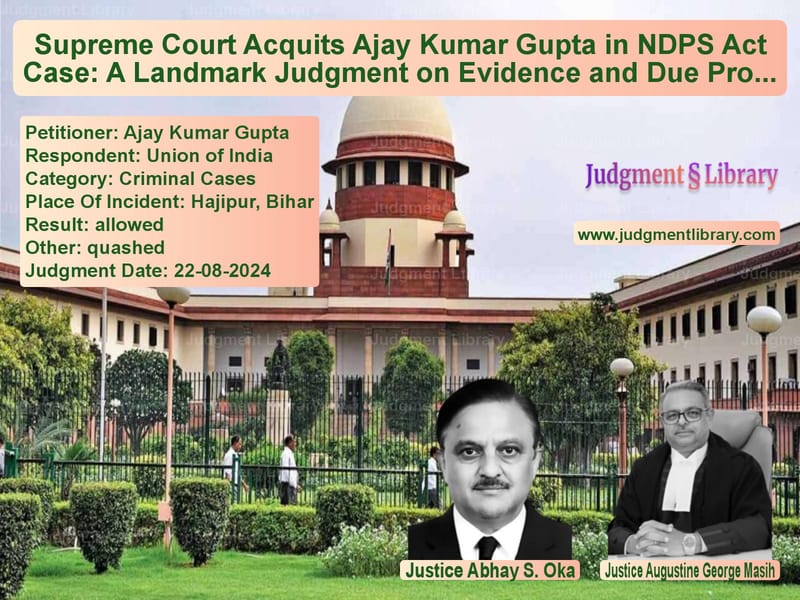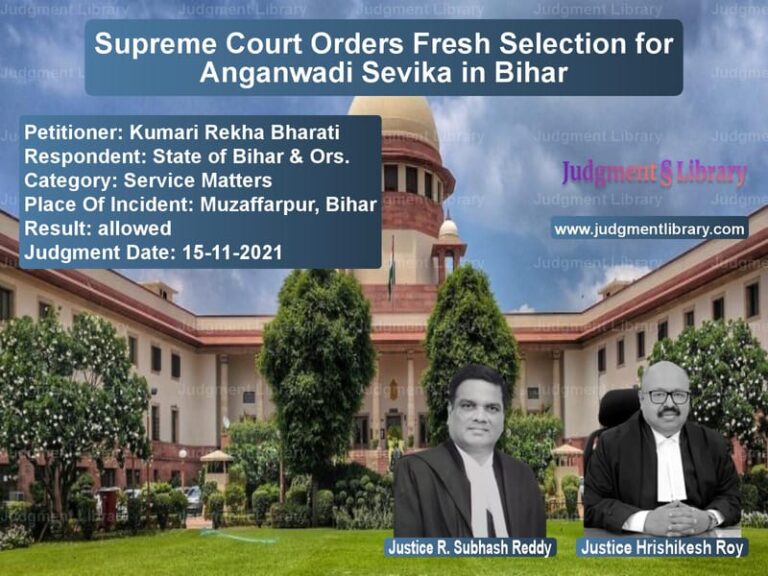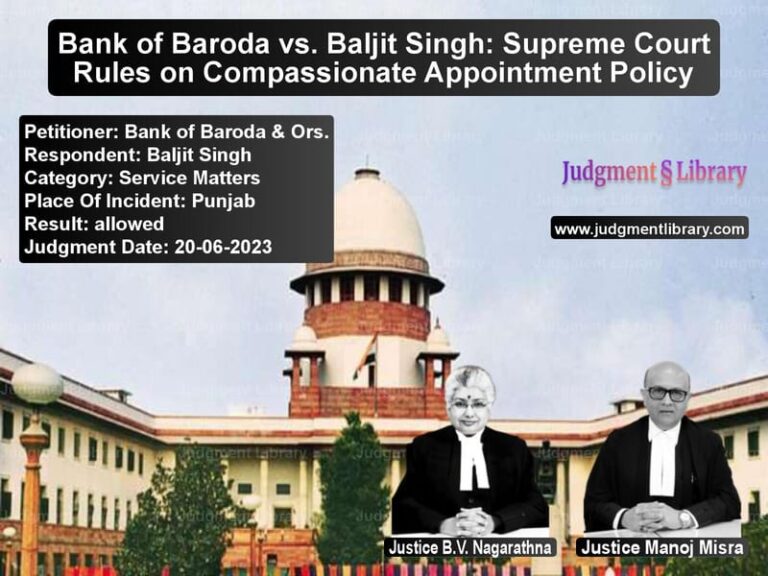Supreme Court Acquits Ajay Kumar Gupta in NDPS Act Case: A Landmark Judgment on Evidence and Due Process
The Supreme Court of India recently acquitted Ajay Kumar Gupta, who had been convicted under the Narcotic Drugs and Psychotropic Substances Act, 1985 (NDPS Act), in a case involving the alleged illegal transportation of pentazocine injections. The case, which had gone through multiple levels of judicial scrutiny, highlights critical issues in the application of the NDPS Act, the admissibility of statements under Section 67, and the burden of proof required for conviction.
Background of the Case
The prosecution alleged that the Narcotics Control Bureau (NCB) received confidential information on December 21, 2013, about a consignment of pentazocine (Fortwin injections) being illegally transported from Hajipur to Lucknow by train. Acting on the tip-off, the NCB team intercepted Jasvinder Singh (Accused No.1) at the Hajipur railway station’s parcel house.
During the search of the consignment booked by Jasvinder Singh, the authorities recovered 30 cartons of pentazocine injections manufactured by Ranbaxy. Upon questioning, he named Ajay Kumar Gupta (Accused No.2) and Sanjay Kumar (Accused No.3) as suppliers of the drugs.
Trial and High Court Verdict
The Special Court convicted the accused under Section 22(c) and Section 29 of the NDPS Act, sentencing Ajay Kumar Gupta to 10 years of rigorous imprisonment along with a fine of Rs. 1,00,000. The conviction was upheld by the High Court, leading the appellant to challenge the judgment in the Supreme Court.
Petitioner’s Arguments
Ajay Kumar Gupta, through his counsel, argued that:
- The charge framed against him was only under Section 22(c) (possession and transportation of psychotropic substances) and not under Section 29 (criminal conspiracy).
- The prosecution relied heavily on statements recorded under Section 67 of the NDPS Act, which were ruled inadmissible as evidence by the Supreme Court in Tofan Singh vs. State of Tamil Nadu (2021).
- There was no forensic evidence proving that the seized consignment was supplied by him.
- The prosecution failed to establish that he was involved in any conspiracy.
- The alleged transporter of the consignment, who could have testified against him, was not examined by the prosecution.
Respondent’s Arguments
The Union of India, represented by the NCB, contended that:
- Jasvinder Singh’s confessional statement under Section 67 directly implicated Ajay Kumar Gupta.
- The invoices of Maheshwari Pharma indicated that the Fortwin injections were supplied by the appellant.
- Ajay Kumar Gupta had a valid drug license but had allegedly misused it to supply contraband to unauthorized persons.
- The recovered cartons matched the ones sold from the medical shop run by Ajay Kumar Gupta.
Supreme Court’s Observations
The Supreme Court made critical observations regarding the prosecution’s case:
- The Section 67 statement of the accused cannot be used to convict him, as ruled in Tofan Singh’s case.
- The charge under Section 29 (criminal conspiracy) was not framed against the accused, meaning he could not be convicted under that section.
- The key witness—the transporter of the consignment—was not examined, raising doubts about the reliability of the prosecution’s case.
- There was no direct evidence linking the appellant to the seized contraband.
- The courts had relied on circumstantial evidence and confessions without substantive proof.
Final Judgment
On August 22, 2024, the Supreme Court ruled:
- The conviction of Ajay Kumar Gupta was quashed.
- He was acquitted of all charges and ordered to be released immediately.
- The reliance on inadmissible evidence and lack of direct proof meant that the prosecution had failed to establish guilt beyond a reasonable doubt.
Implications of the Judgment
The Supreme Court’s ruling sets a significant precedent in NDPS cases:
- Strict Scrutiny of NDPS Cases: The judgment reaffirms that convictions under the NDPS Act must be based on concrete evidence, not mere confessions.
- Admissibility of Evidence: The case further strengthens the precedent that statements recorded under Section 67 of the NDPS Act cannot be used as primary evidence.
- Fair Trial Rights: The ruling ensures that accused individuals cannot be convicted based on unproven conspiracy theories and procedural lapses.
- Burden of Proof on Prosecution: The judgment clarifies that the prosecution must demonstrate direct links between an accused person and seized contraband.
Case Comparisons
This judgment aligns with other significant cases where the Supreme Court intervened to prevent wrongful conviction:
- Tofan Singh vs. State of Tamil Nadu (2021): The Court ruled that confessions made to NCB officers under Section 67 of the NDPS Act are inadmissible.
- State of Punjab vs. Baldev Singh (1999): This case highlighted the importance of ensuring that procedural safeguards are strictly followed in NDPS cases.
- Union of India vs. Mohan Lal (2016): The Court reinforced that failure to prove an essential ingredient of the offence leads to acquittal.
Conclusion
The Supreme Court’s ruling in Ajay Kumar Gupta vs. Union of India serves as a landmark decision ensuring that wrongful convictions under the NDPS Act are prevented. By emphasizing due process, rejecting inadmissible evidence, and upholding the principle of fair trial, the ruling strengthens trust in the judiciary and sets a strong precedent for similar cases in the future.
Read also: https://judgmentlibrary.com/cbi-case-on-ipo-fraud-supreme-court-orders-remand-for-fresh-hearing/
Petitioner Name: Ajay Kumar Gupta.Respondent Name: Union of India.Judgment By: Justice Abhay S. Oka, Justice Augustine George Masih.Place Of Incident: Hajipur, Bihar.Judgment Date: 22-08-2024.
Don’t miss out on the full details! Download the complete judgment in PDF format below and gain valuable insights instantly!
Download Judgment: ajay-kumar-gupta-vs-union-of-india-supreme-court-of-india-judgment-dated-22-08-2024.pdf
Directly Download Judgment: Directly download this Judgment
See all petitions in Drug Possession Cases
See all petitions in Bail and Anticipatory Bail
See all petitions in Public Interest Litigation
See all petitions in Fraud and Forgery
See all petitions in Judgment by Abhay S. Oka
See all petitions in Judgment by Augustine George Masih
See all petitions in allowed
See all petitions in Quashed
See all petitions in supreme court of India judgments August 2024
See all petitions in 2024 judgments
See all posts in Criminal Cases Category
See all allowed petitions in Criminal Cases Category
See all Dismissed petitions in Criminal Cases Category
See all partially allowed petitions in Criminal Cases Category







